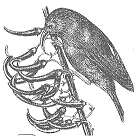The shape of the bill on the bird in Figure 37-2 is most likely the result of:

a. coevolution.
b. pollination.
c. asexual reproduction.
d. pseudocopulation.
e. inbreeding.
A
You might also like to view...
Which of the below processes naturally releases CO2 into the atmosphere (select all that apply)?
A. volcanism B. chemical weathering C. subduction D. biomineralization E. oxidation of fossil fuels (via bacteria)
Malarial parasites are able to evade the active immune response by
a. remaining inside the host cells throughout the whole infection, thereby avoiding exposure to antibodies in the bloodstream. b. secreting substances that block the binding and recognition of their protein by host B cells. c. changing their coat proteins so that the host antibodies in current production cannot bind to them. d. overwhelming the immune cells and antibodies by an enormous production of parasitic cells. e. interfering with the production of memory cells, so that subsequent infections are just as deadly as initial ones..
Lamins are a type of ____
a. myosin b. microtubules c. intermediate filaments d. microfilaments e. actin
During the first four days of development following fertilization, cells of the embryo undergo rapid cleavage, but the size of the embryo remains the same
Indicate whether the statement is true or false